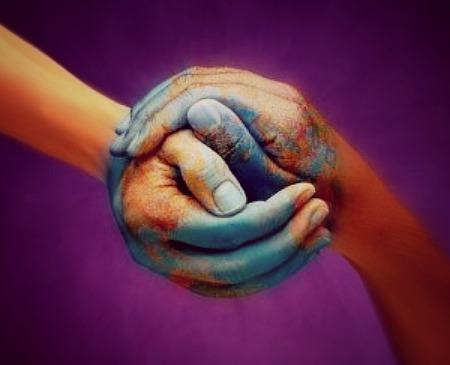Roman Krznaric’s Empathy: A Handbook for Revolution is the kind of book that has the power to transform your thinking. Much like The Wonderbox, which I finished in January, Empathy is the kind of book that will help you understand that there are stunning possibilities beyond the way we currently live – possibilities that may help us to solve some of the biggest problems of our time.

Empathy is an expansion on the chapter that I found particularly important in The Wonderbox – that scratched the surface of the subject. It goes in-depth into the history, psychology and social aspects of empathy, and what empathy means to different people. So what is empathy? It differs profoundly to sympathy and pity – both of which have the issue of seeing people as objects or as stereotypes, ignoring the individual story, emotions and perspective of the person or group of people.
‘Empathy is, in fact, an ideal that has the power both to transform our own lives and to bring about fundamental social change. Empathy can create a revolution. Not one of those old-fashioned revolutions based on new laws, institutions or governments, but something much more radical: a revolution of human relationships.’
Empathy is, instead, an active shifting of perspective, a leap of both imagination and understanding, that requires us to listen to a person or people, to understand their point of view, to either experience or imagine the way that they live their lives. Basically, stepping into their shoes. There are a few ways to experience and actively use our empathetic abilities, from reading, watching films or documentaries, having in-depth conversations, to immersive experiences, such as journalists might employ (going undercover, for example) and taking part in social movements or humanitarian organisations. It can mean both perspective shifting and emotional empathy.
Krznaric puts across a convincing and mind-expanding understanding of the power of empathy across time and history – from such important milestones as the child labour laws, the establishment of the Human Rights Act after the Second World War, to more recent examples such as the Occupy movement and the Arab Spring. These examples show us that though humans have long bought the line that we are bloodthirsty, selfish and egoistic – empathy shines a light through this and shows us that we can, in fact, make a difference to the world around us. We can cross boundaries, connect with people and find new ways to solve the problems of our time – from apathy and narcissism to poverty and inequality.
The book puts across the six habits of highly empathetic people, and goes through the various ways that we can exercise and boost our empathy. The six habits are: switching on the empathic brain, making the imaginative leap, seeking experiential adventures, practising the craft of conversation, travelling in your armchair, and inspiring a revolution.
‘The future of empathy lies not just in the choices we make as individuals to transform our own lives. If we aspire for empathy to fulfil its revolutionary potential as a force for social change, we must generate a deep cultural shift so that looking at the world through other people’s eyes becomes as common as looking both ways when we cross the road. This shift is already under way thanks to the third wave of empathy and the activists behind it.’
Some of these I wondered about, particularly as I struggle with communication, being deaf. For example, it doesn’t come easily to me practising the art of conversation – though I may wish to strike up conversations with people, I often don’t because it may pose various problems, such as miscommunication and misunderstandings, lipreading issues, and so on. However, I have had some interesting conversations online, and one thing that I feel the author didn’t address was the possibility of blogging as a tool for empathy. There are many interesting and eye-opening blogs out there, with a myriad of perspectives. They allow us to step into other people’s shoes and see what their lives are like, even if they live on the other side of the planet. We can also engage in conversation with each other.
Some of the habits are ones that are familiar to me – I read widely and find that an emotional connection and understanding of different perspectives happens this way. When we watch certain films, such as war films from different sides of a conflict, or documentary films about cultures we know nothing about, we can begin to understand more about the world outside our own bubble. We are more likely to act to make a difference when we feel that connection, when we have our eyes opened. Usually this happens when what is happening affects us or someone we know. Yet we also have the capacity to stretch beyond that and find ways of making the world a better place, by attempting to understand the lives of those with experiences wildly different to our own.
One way in which I do this is to try and see the different sides of a story, to be more open-minded and to listen to and notice more carefully the nuances in life. We can never fully know what it is like to be another person. We can attempt to understand them better but the most important step is to stop ‘othering’ people – viewing unknown strangers as the ‘other’. We are all connected in some way. We all live, work and exist on the same planet, even if we live completely different lives. Yet we all look up to the same sky and see the same moon and stars, are subject to the same laws of gravity and passing of the years.
‘Some people think only intellect counts: knowing how to solve problems, knowing how to get by, knowing how to identify an advantage and seize it. But the functions of intellect are insufficient without courage, love, friendship, compassion, and empathy.’ – Dean Koontz.
What we do now, the resources we consume, the decisions our governments make – impact on the lives of others, not just us. And Empathy: A Handbook for Revolution helps us to realise that there are things we can do – ripples we can set in motion. Empathy is one of the most powerful tools we can use to make a difference.

Reblogged this on momentarylapseofsanity.
LikeLike
You raise an excellent point about blogging as a way to spread empathy. In fact, I think it is so accurate, you should contact the author and suggest it be added in future additions of the book. As always, it is a pleasure to catch up with you and broaden my knowledge through your reads.
Love,
E
LikeLiked by 1 person
Reblogged this on barclaydave and commented:
Food for thought. There is a new wave of empaths? I’m happy to see things through the eyes of others, but don’t think of them as different. After all cut us and we bleed, red blood, we all blister and can burn in the sun.
LikeLike
Retweeted this very interesting post. Glad to have come across your blog, look forward to reading more.
LikeLiked by 1 person
Thanks you for that review. Both of those books seem like amazing reads. I’ve been looking for some summer inspiration – I think I may have just found it!
LikeLiked by 1 person